
Small businesses are using AI to increase revenue, save time, and improve operations. Here are five AI tools that have helped businesses generate over $1 million each:
| Tool | Focus Area | Revenue Impact Examples | Starting Price |
|---|---|---|---|
| God of Prompt | AI-powered prompts | $300K annual revenue for businesses | Free ($150 premium) |
| ChatGPT | Content & automation | 29% efficiency boost for users | $20/month |
| ManyChat | Social media automation | $65M in sales for users | Free ($15/month Pro) |
| Lindy | Workflow automation | Saves time, boosts lead conversions | Custom pricing |
| Tidio | Customer communication | €177K revenue increase for users | Free ($18/month premium) |
These tools show how AI can help small businesses grow by automating tasks, improving customer experience, and increasing efficiency.
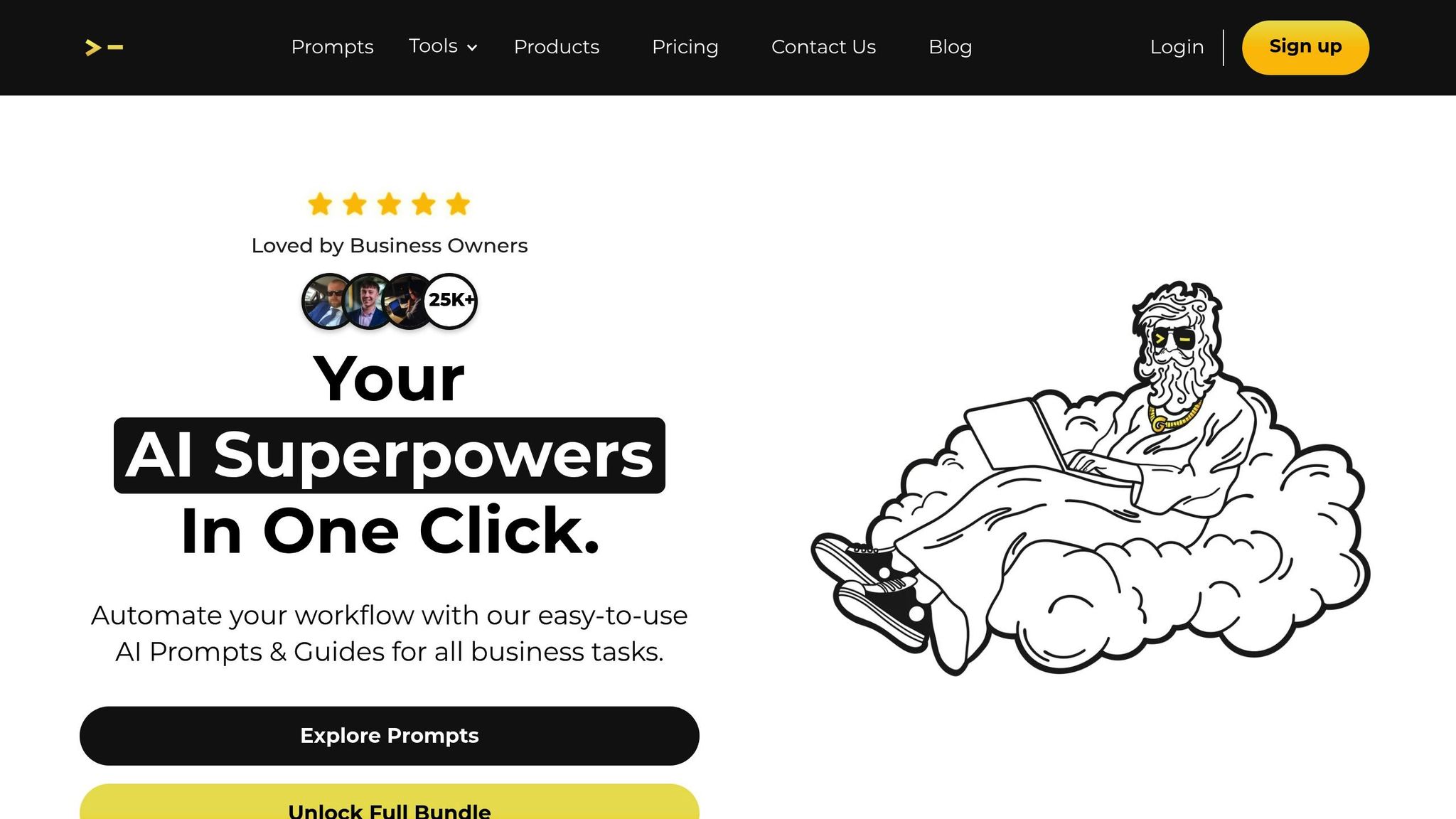
God of Prompt is an AI-powered prompt library designed to transform how businesses approach content creation and marketing. Founded by Alex, this platform has grown into a thriving business, generating $300,000 annually by helping companies streamline their operations and increase revenue with strategic AI solutions.
The platform offers a massive collection of over 30,000 prompts tailored for tools like ChatGPT, Claude, Midjourney, and Gemini AI. These prompts are neatly categorized by business functions such as marketing, SEO, content creation, sales automation, and administrative tasks.
These prompts aren’t just generic - they guide users through tasks like market analysis, digital marketing strategies, budget planning, and tracking performance metrics. With regular updates and a user-friendly Notion-based interface, accessing and applying these prompts is straightforward and efficient.
God of Prompt has applications across various business needs:
Alex attributes the platform’s success to its ability to simplify complex marketing efforts:
"This prompt has become the foundation of my $300,000-a-year digital products business, helping me and my clients achieve remarkable growth and success."
By feeding ChatGPT detailed business data - like target audience insights and competitive analyses - users can craft comprehensive marketing plans that boost visibility and drive sales. The time saved translates directly into reduced costs and improved productivity, making it an invaluable tool for small businesses.
God of Prompt seamlessly integrates with popular AI platforms like ChatGPT, Claude, Midjourney, and Gemini AI. It also connects with essential business tools, ensuring compatibility with existing workflows. The Notion-based delivery system makes it easy for users to access prompts from any device, copy them, customize them, and implement them as needed.
The platform offers flexible pricing to suit different needs. Options range from a free plan featuring 1,000+ prompts to the Complete AI Bundle for $150, which provides access to all 30,000+ prompts, unlimited customizations, and lifetime updates.
Next, we’ll explore how ChatGPT contributes to the growth of small businesses.
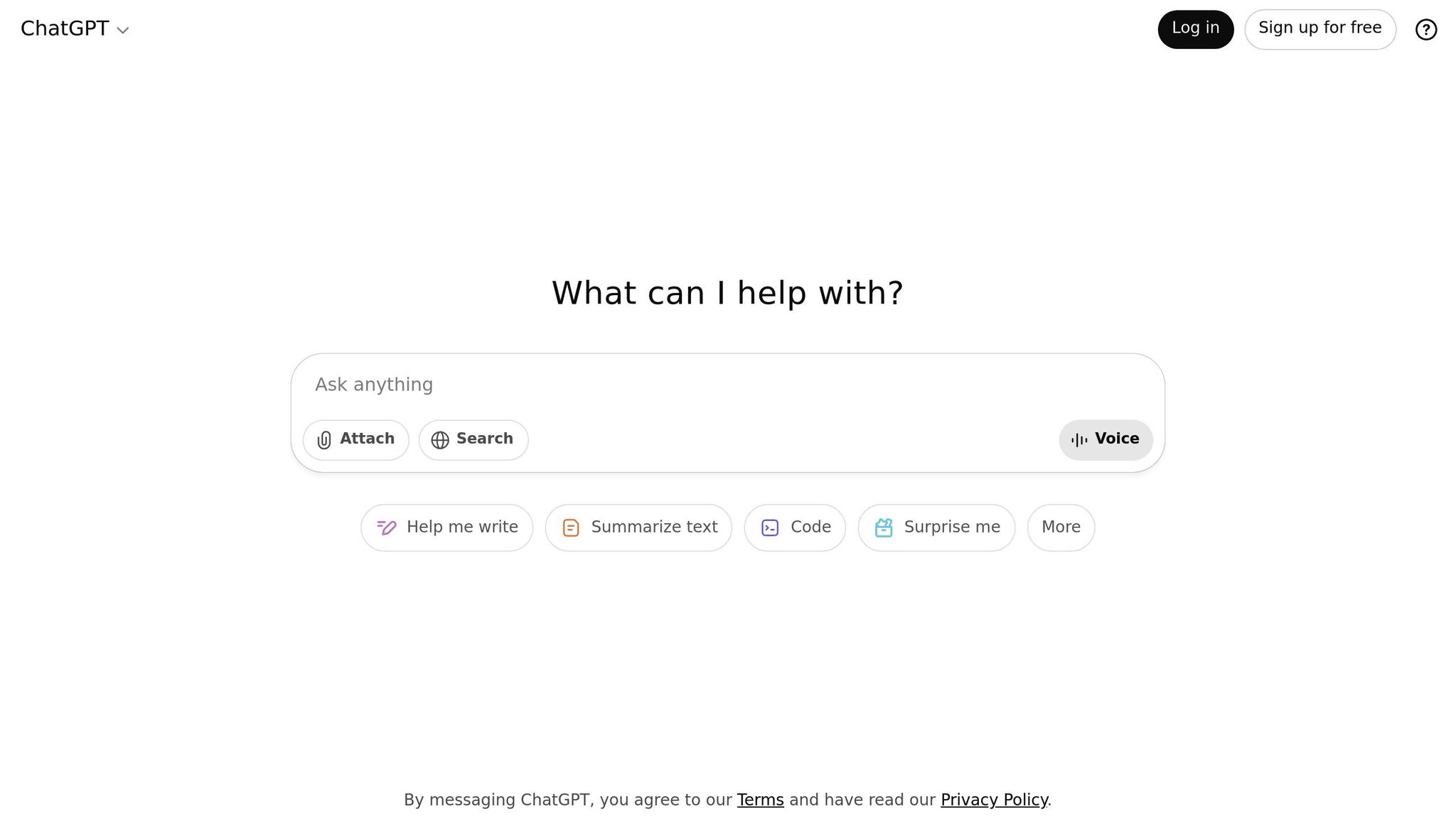
ChatGPT has become a go-to tool for businesses, with 49% already using it and another 30% planning to adopt it soon. This generative AI chatbot has proven its value by streamlining operations, improving customer service, and driving revenue growth.
ChatGPT functions as a multi-purpose AI assistant, capable of generating content and automating tasks. It’s particularly effective for creating marketing materials such as blog posts, articles, emails, and advertisements. Teams also use it as a brainstorming partner to come up with fresh ideas and explore new topics for campaigns. Beyond content creation, ChatGPT automates customer support by managing basic inquiries 24/7 - a crucial feature considering 90% of customers expect immediate responses. It also takes on administrative tasks like coding, research reporting, simulations, and strategic analysis.
The practical applications of ChatGPT span various industries. For example:
For small businesses, ChatGPT has been a game changer. About 29% of companies using AI technologies have reported improved operational efficiency. According to the Rhode Island Small Business Development Center:
"ChatGPT is a powerful tool that can help small businesses become much more efficient, improve customer engagement, and ultimately increase sales."
Quick response times, a key feature of ChatGPT, are also a major driver of customer satisfaction. Over 70% of consumers aged 16–24 say that fast responses significantly enhance their experience. Additionally, the platform’s ability to automate marketing and streamline content creation enables businesses to produce more materials - like SEO-focused blog posts and email campaigns - at a fraction of the usual cost.
ChatGPT offers various integration options to suit different business needs. For teams with technical expertise, direct API integration provides complete control. Meanwhile, no-code platforms make it easy for non-technical users to deploy the tool quickly. It also integrates seamlessly with popular platforms like Google Drive, GitHub, SharePoint, Box, Dropbox, and Microsoft OneDrive. Microsoft has further embedded ChatGPT into its products, including Bing, Excel, and PowerPoint, as well as GitHub Co-Pilot, where it appears as Codex to offer intelligent coding suggestions.
For businesses exploring ChatGPT, there’s a free basic tier available for testing. For advanced features, ChatGPT Plus - powered by GPT-4 and offering enhanced problem-solving capabilities - is available for $20 per month. API access operates on a pay-as-you-go model, allowing businesses to scale usage based on their needs.
Next, we’ll take a closer look at ManyChat and how it supports small business growth.
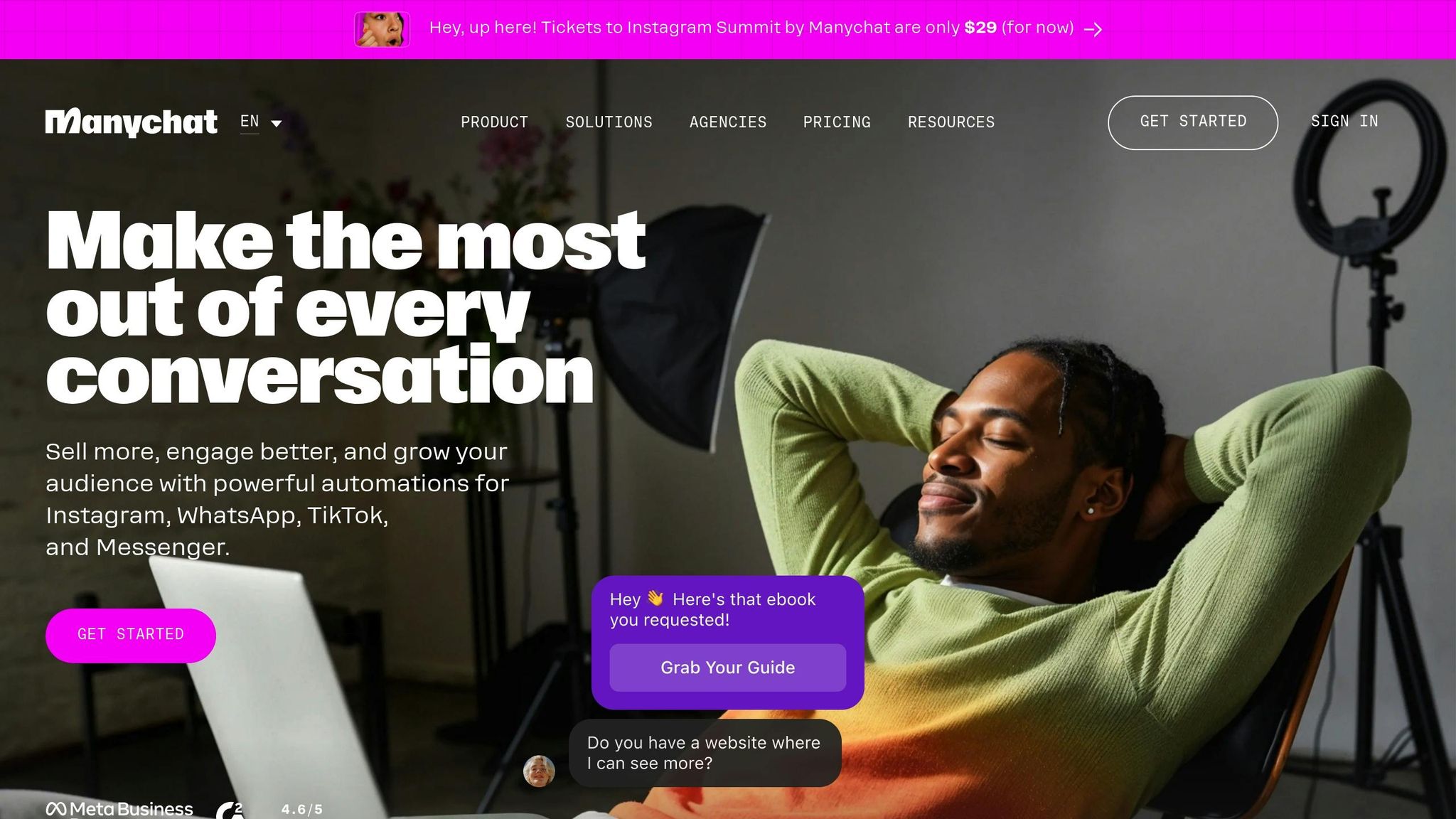
ManyChat is a platform designed to help small- and medium-sized businesses automate their communication and drive sales through popular messaging apps like WhatsApp, Instagram, and Facebook Messenger. According to research, 42% of B2C and 58% of B2B companies are already using chatbots to enhance their operations.
Natasha Willis, COO of School of Bots, shared:
"We've used ManyChat to generate over $65 million in sales for digital product and e-commerce businesses."
ManyChat offers a user-friendly drag-and-drop visual flow builder, enabling businesses to create tailored chatbot conversations. It allows responses to be triggered by specific keywords and includes growth tools to boost engagement. Features like live chat handoff ensure smooth transitions to human agents when needed. Businesses can also make use of interactive tools, such as buttons, images, and videos, along with contact list management and a detailed analytics dashboard to monitor performance and customer behavior.
The platform supports Instagram conversation automation and integrates Facebook comment tracking directly into a business’s inbox or CRM, making it easier to manage customer interactions and drive measurable revenue growth.
ManyChat’s capabilities are backed by compelling case studies:
ManyChat’s tools, like abandoned cart recovery, are particularly effective for recapturing lost sales. Considering that 88% of online shoppers abandon their carts, these features help businesses recover significant revenue. With 85% of customers opening SMS marketing messages, ManyChat’s SMS capabilities also prove to be a powerful tool for engagement.
For example, Roma by Rochi ran a giveaway using Instagram automation, resulting in a 741% jump in engagement and an 82% boost in reach. Similarly, Candace Junée experienced a 118% increase in leads compared to traditional landing pages, all while saving 15 hours per month on Instagram DMs.
ManyChat seamlessly integrates with a variety of tools, including:
As an official Facebook Marketing Partner, ManyChat also provides native integrations with Instagram, WhatsApp, Messenger, and TikTok.
Pricing is flexible to suit different business needs. The free plan supports up to 1,000 contacts, while the Pro plan starts at $15 per month and scales based on the number of contacts. For larger businesses, custom Elite plans are available.
Next, we’ll dive into Lindy and its role in empowering small businesses.
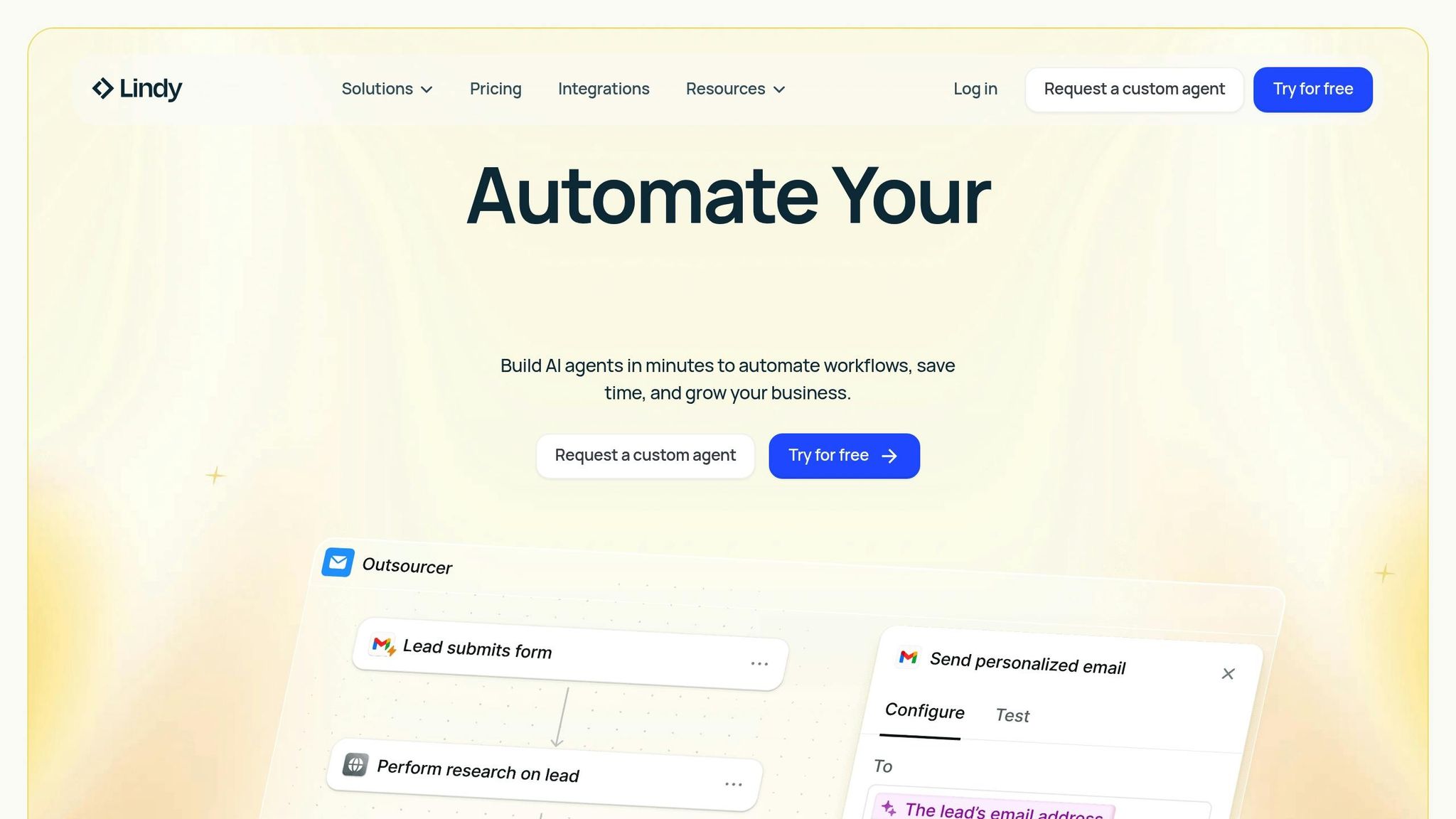
Lindy takes the concept of chatbots and automation a step further, offering a platform that boosts business efficiency through no-code AI agents.
This platform enables users to create AI agents that work around the clock, handling multi-step workflows across various tools. What sets Lindy apart is its simplicity - users can describe tasks in plain language, and Lindy converts those instructions into automated workflows. No coding skills or complex setups are required.
Lindy's AI agents are versatile, managing everything from straightforward tasks like updating Slack or Salesforce to more intricate processes, such as lead qualification, meeting scheduling, and CRM updates. These agents operate 24/7, tackling inbox management, document processing, and customer interactions. The platform provides a visual workflow builder with prebuilt templates tailored to industries like real estate, medtech, and SaaS. Users can also choose between AI models like GPT, Claude, and Gemini, while human-in-the-loop controls ensure critical actions are reviewed before proceeding. This flexibility and functionality make Lindy suitable for a wide range of applications.
Lindy is a go-to solution for small businesses looking to optimize operations. It simplifies lead intake and appointment booking by automatically capturing leads and scheduling meetings. Document processing becomes more efficient, with Lindy managing tasks like invoice handling, contract analysis, and internal reporting. For customer support, it triages inquiries and retrieves answers from company documents or past support tickets, integrating seamlessly with tools like Slack and websites. Sales teams benefit from automated outbound processes and internal research, allowing them to focus on closing deals.
While specific revenue numbers aren't provided, Lindy’s ability to save time and improve efficiency is evident. For example, one founder shared how Lindy acted as an AI receptionist, freeing the operations team from constant lead management. This allowed the team to concentrate on more strategic tasks. Additionally, Lindy’s 24/7 operation ensures that leads are captured and processed even outside regular business hours, potentially boosting conversion rates and creating more revenue opportunities.
Lindy integrates with over 1,500 tools, including Gmail, Google Calendar, Slack, major CRM platforms, Google Sheets, Notion, Airtable, and Salesforce. It also supports APIs and webhooks for custom setups. For industry-specific needs, it connects with EMRs in healthcare and specialized platforms in real estate, ensuring smooth adaptation to various sectors. This broad integration capability helps businesses avoid workflow disruptions and enhances overall efficiency.
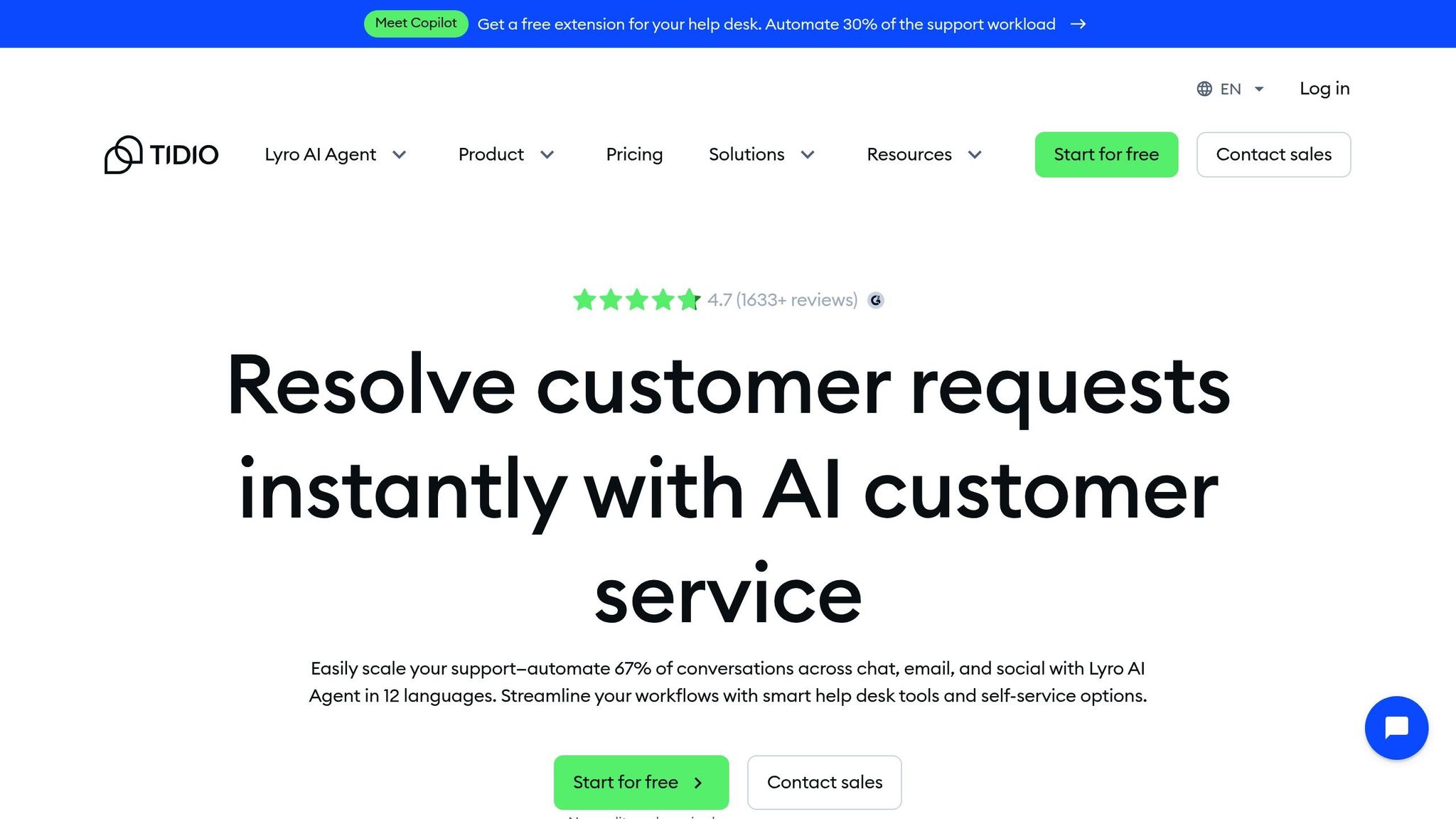
Tidio is a customer communication platform that brings together live chat, AI chatbots, and email marketing into one solution. Designed for small businesses, it simplifies customer interactions and supports lead generation, ultimately driving revenue. By consolidating messages from websites, social media, and email into a single dashboard, Tidio makes managing customer relationships far more efficient.
Tidio stands out thanks to its multi-channel approach. It offers a customizable chat widget that integrates directly into websites, powered by AI chatbots. These bots handle up to 67% of support inquiries, while its AI tool, Lyro, manages 70% of common questions, reducing response times by an impressive 75%. The platform also merges live chat with automated workflows, making it easy to capture leads, qualify prospects, and provide 24/7 support. With its visual workflow builder, businesses can create custom chat flows without needing technical skills. Plus, the unified inbox ensures no customer message goes unanswered.
Tidio’s features are widely used across industries to improve customer experiences and boost conversions. For example:
The platform is also effective in recovering abandoned shopping carts by re-engaging customers and managing after-hours inquiries to ensure timely responses.
Tidio’s impact on revenue is notable. Take eye-oo, an Italian multi-brand eyewear platform, as an example. They saw €177,000 in revenue growth, a 25% increase in sales, and a fivefold boost in conversions thanks to Tidio’s chat flows. With customer wait times reduced from 2–5 minutes to just 30 seconds, the platform helped manage 1,825 conversations and generate 1,305 leads. Evelin Lopez, their Marketing Manager, shared:
"Since changing to Tidio and implementing the cart abandonment chatbot, we were able to increase the number of conversions. From the 537 conversations the bot managed, it assisted in 1.6k EUR total sales in 2023 alone."
Other users report similar successes, including conversion rate improvements from 1.4% to 4.8% and a 34% rise in sales leads within hours. One business owner even credited Tidio with generating over $60,000 in sales in a few months, nearly doubling overall sales and significantly increasing positive reviews.
Tidio’s compatibility with various tools and platforms makes it highly versatile. It integrates with leading e-commerce platforms like Shopify, WooCommerce, BigCommerce, and Adobe Commerce, as well as website builders such as WordPress, Squarespace, and Wix. For marketing and sales, it works seamlessly with tools like Mailchimp, HubSpot, Klaviyo, and Salesforce. Analytics integration is available through Google Analytics, and it supports CRMs like Pipedrive and Zendesk. Social media integrations include Facebook Messenger, Instagram, and WhatsApp, while Zapier allows connections to thousands of other apps. Premium plan users also have access to implementation specialists for tailored integration support.
This table provides a clear snapshot of the main features, use cases, revenue benefits, integrations, and pricing for each AI bot.
| AI Bot | Core Functionalities | Primary Use Cases | Revenue Impact Examples | Key Integrations | Price |
|---|---|---|---|---|---|
| God of Prompt | 30,000+ AI prompts, categorized prompt bundles, custom GPT toolkit, prompt engineering guides | Content creation, marketing campaigns, SEO optimization, workflow automation | Optimizes AI interactions across platforms to streamline business operations | ChatGPT, Claude, Midjourney, Gemini AI, Notion | Free (Premium from $37) |
| ChatGPT | Conversational AI, writing assistance, research automation, task management | Customer service, content generation, data analysis, business planning | Assists small businesses by automating writing, research, and operational tasks | API integrations, third-party apps, custom applications | $20/month |
| ManyChat | Social media automation, lead capture, conversation flows, broadcast messaging | Instagram/Facebook marketing, lead generation, customer engagement, sales funnels | Automates social media interactions to capture leads and manage direct messages at scale | Facebook, Instagram, WhatsApp, Shopify, Zapier | Free (Paid from $10/month) |
| Lindy | Custom workflow automation, lead routing, appointment scheduling, task management | Business process automation, lead qualification, administrative tasks, team coordination | Saves time by automating lead routing, qualification, and scheduling discovery calls | CRM systems, calendar apps, email platforms, custom APIs | Custom pricing |
| Tidio | Live chat, AI chatbots, email marketing, unified inbox, visual workflow builder | Customer support, lead generation, cart abandonment recovery, multi-channel communication | Improves real-time customer support and follow-up interactions | Shopify, WooCommerce, WordPress, HubSpot, Mailchimp, Facebook Messenger | Free (Paid from $18/month) |
This breakdown highlights how each AI bot supports small businesses in distinct ways, showcasing their ability to drive revenue growth and improve workflows.
For instance, platforms like ManyChat and Tidio excel in customer engagement and lead generation through social automation and live chat. Meanwhile, God of Prompt and ChatGPT focus on content creation and task automation, making them ideal for streamlining operations. Lindy, on the other hand, stands out with its custom workflows tailored to business process automation.
When it comes to pricing, there’s flexibility to suit different budgets. Freemium models from Tidio and ManyChat offer accessible entry points, while ChatGPT provides a straightforward subscription. God of Prompt offers lifetime updates with a one-time purchase, making it a cost-effective choice for long-term AI utilization. Ultimately, the right platform depends on your business needs - whether you prioritize marketing, operational efficiency, or customer support.
The five AI tools highlighted in this article demonstrate how AI can deliver game-changing results for small businesses. From the extensive prompt engineering capabilities of God of Prompt to the automation features of ChatGPT, these tools show that smart use of AI can often outshine even the biggest budgets.
For small and medium businesses, the numbers speak volumes. Companies adopting AI report increased revenue, with sales teams using AI growing 83% faster than those that don’t. On the marketing side, 40% of AI adopters have seen their revenue grow by more than 6%. Industry experts echo these findings:
"People get into small business because they have a passion for the end product - not the process of getting there. There's a lot you have to know, learn, or hire out, and each comes with a cost. We're getting to the point where AI can be your accountant, your business advisor, and so much more, freeing you up to spend time on the parts of your business that bring you joy… and even to level up your business." - Ryan Prellwitz, Owner of Vines & Rushes Winery
If you're ready to take the leap, start with one AI tool that addresses your biggest challenge. For example:
To see real results, focus on strategic implementation. Use precise prompts to achieve specific outcomes and integrate AI tools with your existing systems. Whether it’s connecting ManyChat to your CRM, linking Tidio with your e-commerce platform, or applying God of Prompt’s resources across your workflows, seamless integration is key to maximizing ROI.
On average, businesses see a 3.7x return on investment from AI, with top performers achieving growth of over 10x. Small businesses make up 90% of global industries and contribute nearly half of the world’s GDP. As a small business owner, you’re part of an economic force that’s just beginning to tap into AI’s potential.
With 40% of small business owners already using generative AI, now is the time to act. Identify the AI tool that can make the biggest difference for your business and start integrating it today.
To choose the right AI tool for your business, start by pinpointing your specific goals and challenges. Are there repetitive tasks you want to automate? Processes that could run more smoothly? Or perhaps particular problems you’re aiming to solve? Getting clear on your needs is the first step.
Next, dive into research. Look for tools that align with your objectives and check out vendor reputations by reading customer reviews. It’s also important to consider how the tool handles data and whether it integrates seamlessly with your current systems. Whenever possible, take advantage of demos or pilot programs to test how the tool performs in practical, day-to-day situations.
By following these steps, you’ll be better equipped to choose an AI tool that fits your needs and helps your business thrive.
To bring AI tools into your business successfully, start by setting clear objectives that align with your broader goals. Pinpoint specific areas where AI can make a difference - whether it’s streamlining operations, cutting costs, or improving customer interactions.
Next, launch with small pilot projects. These allow you to test how the AI tool performs and tackle any issues before committing to a full-scale implementation. This step minimizes risks and gives your team time to adjust to the new technology.
Lastly, define key performance indicators (KPIs) to track the AI’s effectiveness and ensure it delivers results. Foster collaboration between your team and the AI system to get the most out of it, and continuously tweak its role to fit seamlessly into your processes.
When choosing between free and paid AI tools, small businesses should weigh their budget, the specific features they require, and the support options available. Free versions can handle simpler tasks, but paid plans often unlock advanced capabilities, better security measures, and quicker access to customer support.
Another key factor is scalability - can the tool keep up as your business grows? If you're planning for expansion, opting for a premium version could save you both time and effort down the road. The best choice is the one that fits your business goals and offers the most value for your needs.






